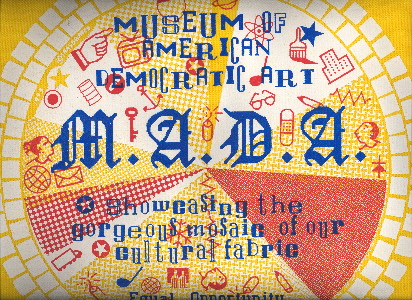
>>Wall
text for MADA: Tumbling Chairs at
Center for the Fine Arts, Miami, 1994<<
César Trasobares, Born 1949
Museum of American Democratic Art: Tumbling Chairs, 1994
Natural wood director's chairs, silkscreened and painted canvas
Courtesy of the artist
This installation for the CFA expands the original study
for this sculpture made at the Shoshana Wayne Gallery in Santa Monica, California,
in June 1993.
"The project consists
of an installation of 60 chairs serving as a kind of metaphorical imaging
of the movers and shakers of an imaginary museum I
invented while working
as an art administrator. The image of the chair is based in part on the popular
director's chair, used in the movie industry as a kind of ex officio podium,
carrying the label of its occupant's function. The labeled chair is also
based on desktop plaques with institutional titles and the boxes used to diagram
roles in Tables of Organization.
This imaging of the museum emphasizes the human side of the institution. It
focuses on the internal dynamics —the agents— that make its functioning possible.
By emphasizing the players and the perspectives driving the institution, I'm
posing questions about who controls and determines the presentation of works
of art. In a pattern of social agendas and intentions, the artists' own desires
are adopted and co-opted by others for their purposes and agendas.
The logo for M.A.D.A. emerged in 1992. It is a compounding of the proverbial
'American pie' with the ubiquitous 'cultural fabric' metaphor. It includes a
series of symbols alluding to contemporary culture, embracing ideas of diversity
and multiplicity of voices. It carries the 'Equal Access, Multicultural Opportunity'
guarantee and the organization's mission: 'Showcasing the gorgeous mosaic of
our cultural fabric.' Each chair has the M.A.D.A. logo silkscreened on the seat
while the back carries the fictionalized titles.
I am hoping that the piece encourages viewers to adopt the roles/positions
of the empty chairs and to verbalize (internally or externally) their perceptions
of each role. As in the technique of Gestalt therapy, the analyzed (the players,
the audience) are invited to sit (mentally) in each position and to speak
their minds."
César Trasobares
